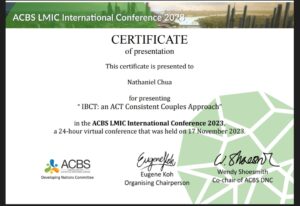Tag: Counseling for Depression
Letting Go to Gain Control, Video!
Listen to this on Spotify:
Letting Go to Gain Control
by Nathan Chua
The School Play:
I remember some of the most fun I had back in my school days, was when we had to do role plays. Not just any other role play, but actually create a skit as a medium to learn. There’s also very little pressure as these were done in front of a class only and not a major production wherein a whole auditorium of students were there to watch.
My Louis Vuitton Story:
I once entered an LV store in Metro Manila, and scoured through some of the merchandise. As I was doing that, I noticed the attentiveness of the sales people as there were hardly any people around who were shopping. I looked at some items that I thought were very impressive and their price tags. As I was on my way out, I said, “I love your products but I can’t afford any of them!”
Walking around with plastic buckets:
Have you ever had a time when you and your friends went out and knew that you were all going to do something rather unconventional and at times downright embarrassing? Of course, always in the spirit of good clean fun. Well, I am one of those who has gone out with a group of my high school male friends wearing clothes that should only belong to the home, carrying plastic buckets and brooms, and going inside a mall to deposit the stuff we had at the front of the department store where people usually leave their shopping items.
Ordering a siopao at Mcdo:
When I am in a fast food restaurant, I sometimes order something obviously unserious at the counter. For what reason? Nothing just for fun! As the heading for this paragraph tells you, I have in the past ordered the Jollibee Chicken Joy at a McDonald’s restaurant!
Which leads me to how I got to think about writing something like this for all of you. When I did those I did not know anything about contextual behavioral science. About a couple of weeks ago, I found an online audio resource created by Steven Hayes, the developer of ACT (Acceptance and Commitment Therapy) and RFT (Relational Frame Theory). He shared one of the ways we can pop that bubble or illusion that says we do what we think, by doing exactly what I had been doing sporadically since oh, high school? I hadn’t realized doing these crazy things weren’t just fun, they were also about letting go of some of the rules that we tend to sell our lives to! What I was doing was letting go of the rules that shackled me from pursuing what would be psychologically risky, but at the same time liberating. I can choose to be how I want to be at any given moment!
This article reminds me of my father. He was a good but also misunderstood man. Believe me, I was one of those who did. He had always been a businessman who inherited a family business. Through decades of working in the business, he could not manage to make a sizable profit. He found himself mired in debt until the day he passed. There was one skill that we, his kids, thought that could have made him a world-class cartoonist. We saw some of his drawings of caricatures of his friends with a pen! His every line had a precision that he didn’t need a pencil to make his initial sketch. Awesome talent that was never discovered nor shared with more people because he thought he couldn’t.
Are you living with can’ts, shoulds, musts in your life? Yeah they sure feel safe, but do they make you feel alive? Doing what your mind tells you you can’t, is a part of the exercise towards breaking that bubble. That bubble that says you can’t get out of that family business that is so comfortably limiting. That bubble that says you can’t do this or that. Don’t get me wrong, it is not my intention to tell you that anyone can be anything. We all do have limits. The question is, have you tested the limits and seen how liberating it can be on that side where your mind says no, you can’t. And maybe you can just, by doing these silly things for nothing, be you, and no one else but you!
Is Counseling Really Worth All the Risks? Video!
Listen on Spotify:
Nathan Chua’s Presentation in November 2023 to an International Group!
On November 17, 2023, Nathan had the privilege of presenting a talk for an international audience of therapists from Low or Middle Income Countries (LMIC) about Integrative Behavioral Couples Therapy. Certificate of Presentation below:

Anger Management Interview – Video
Hi everyone!
In this episode from MakiAlam with hosts Pelita Uy and Angelo Almonte, I discuss the recent reports about an irate employer who physically abused a housekeeper. For all of you who have anger issues like I do, I hope you learn a few things here.
What makes One Life Only Counseling Services different? Video!
Fourteen Years of: “Just Call Me Nathan.”

by Nathan Chua
One thing I dislike is titles. I have always been uneasy with titles unless they were used in settings where it is necessary to set limits, respectful, honorific or makes it easier to identify the people being referred to. The counseling room has never been a place where I thought titles were necessary. One thing that I don’t want to impart to any of the people I see. is for them to view me as someone who’s got it all together somehow. I don’t want them to think that I have some kind of panacea that will answer all of life’s problems. I love the way one ACT (Acceptance and Commitment Therapy) expert put it, and I will paraphrase it here. I often use this metaphor to describe the kind of relationship I will have with my clients. I am not ahead of them nor am I on top of them looking down. We are just two people climbing up our own mountains that are facing each other. My job is to see what’s ahead of you as you climb yours and give you signals when I see what’s coming your way.
Which brings me to the point that I want to make in this article. What on earth are we doing counseling for? If you have had this question come across your mind before, don’t be alarmed. I have asked myself the same question many times before. Through more than a decade’s work, I have hypothesized about this. As a healer, I thought that my job was to relieve symptoms. As a humanist, I thought that it was to find acceptance and purpose. As a psychodynamic counselor, I thought my job was to come to terms with the past. Today however, as a behaviorist, I have come to see that counseling is about being able to handle our difficult thoughts and feelings in a more effective way.
To date, I still find behaviorism to hold the most promise in helping alleviate human suffering and promoting successful living. Please remember that successful living in this context is not about having the most financial success or the happiest existence. Successful living is about helping people live up to their greatest potential. This is not in the service of any temporary exuberant feelings nor is it about having great wealth, but about having a life that’s meaningful to the unique aspirations of every individual.
What I find hopeful in behaviorism is the goals that it establishes that are based on scientific evidence. A metaphor that ACT therapists use to describe the process is like learning to speak a new language. If we spend a long enough time using a new language, we will start to get used to it and eventually not go back to using our old language. Nonetheless, learning that new language does not mean that we completely forget the old one.
In less metaphorical language, it simply means trying out new or different ways of behaving in the face of life’s problems. There is an old ACT saying among therapists which goes like, I don’t have tricks to change how a client feels, but I have tricks to help a client live the life they want even with those difficult thoughts and feelings. Here are some examples of how this can be manifest in a life:
- If you react to painful experiences by griping and ranting, then maybe try sitting with the pain with compassion and find out why it pains you. Maybe it tells you that you care about something that is life-giving and loving.
- If you react to painful experiences in relationships by running away, then maybe try to learn new ways of staying put and communicating more effectively to let the other person know how important they are to you.
- If you react to painful experiences by distractions like drugs, alcohol, binge watching, or even working, then maybe try to see if you’re missing out on the more important goals or relationships you had in mind before the challenges came.
I don’t know if there’s better science out there. I would like to find out. For now, it’s been quite the adventure of a search for what best serves the lives of those I see. If there is one thing that I am slowly losing while learning ACT, it’s my ego. Good riddance! I am just your fellow sojourner my friends, and that’s why I’d appreciate it if you’d just call me, Nathan.
Thank you for fourteen years. Your shared lives have made mine sweeter and more worthwhile.
Pain vs. Suffering Video!
Pain vs. Suffering
by Nathan Chua
There’s an old aphorism that goes, “Pain is inevitable, suffering is optional,” credited to Japanese writer, Haruki Murakami.* Have you seen a kid who was disappointed by a parent or primary caretaker who wasn’t as appreciative of a pyramid of blocks it created, and then proceeds to wipe out the masterpiece with one quick stroke of an arm? I do remember myself doing so but can’t remember what my creation was. If we look closely, we as adults sometimes revert to this way of coping with the inevitable hard feelings or the pain we get in situations at home, at work, and at random moments in our days.
I am here borrowing a series of questions you might ask yourself when faced with a challenging moment in these situations. This can help you see if you may be causing more pain on top of what is already an emotionally difficult moment. I borrowed this from a book written by experts in functional analytic psychotherapy.**
- In that situation, can you notice what it is that you do in reaction to it?
- If another person is involved, what do they do in response to your reaction?
- What do you think it is that you do that aggravates or contributes to the problem?
- Did the way you reacted show up in other places or with other people?
- What is immediately rewarding about what you do?
- What is it costing you in the short term?
- What do you foresee will happen if you continue doing what you’re doing in the long run?
- What would happen if you stopped doing what you’re doing now? What would you have to be willing to accept?
- Is there a purpose important enough for you to accept or face that?
In your relationships with your partner or your family:
When people in close relationships fight, there’s usually a reason for such behaviors. Very often life’s stressors provide enough of a catalyst for differences and emotional sensitivities to be highlighted. Couples and parents often believe that their partners or children need to be exactly just like them. There is a tendency to believe that what is evident to one should be evident to the other. There is nothing wrong with these thoughts for that is a typical function of our minds. We compare and find out what should or should not be the same. However, in your attempts to change the other, what results do you notice you get? And if you didn’t do this, maybe you would have to accept that you and your kid or your spouse are different from you. Now is there a purpose here for which you would be willing to accept that?
In your relationships at work
Just like in other areas in your life, change happens at work. Let’s take for example your boss. We all hope that we have only one boss who happens to like us and the way we work, usually for life! Unfortunately, that is not, most of the time, under our control. Many decisions from within the hierarchical structure are handed down from above. So ask yourself the questions posed above. Let’s say you end up consuming hours contemplating how bad things have been since your company had a change of management. You may notice that there are short term costs involved in this behavior, like procrastinating on your work tasks. In the long term, such a habit can only lead up to you losing your job or getting bad marks on your performance. Would you be willing to accept the fact that companies change and at times your boss will frustrate or be different from you? What would be reason enough for you to accept this reality? Is it the family that you love and care about who depend on your job to sustain their needs or even lifestyles? Is it that long wished for vacation that you planned to spend with loved ones?
At random moments
You and I know that driving in a megapolis like Metro Manila can be rather challenging. Anger and frustration are easy to come by when you have to contend with multiple threats to your peaceful drive home. When you yell and scream inside your vehicle while your kids and partner are with you, what do you notice are the payoffs and both short and long term negative consequences? Has it gotten in the way of an otherwise happy ride home? Would you have to accept that at times driving in an overcrowded city can be challenging? Is your drive home important enough of a reason for you to hold your peace?
There you go my friends. Hope these examples will give you a snippet of what you can learn from what the experts have painstakingly worked to provide us with, which is the knowledge that we are not free from life’s pains, but we are free to choose how we respond to them. Will we follow old rules of thumb that have both long and short term costs to what otherwise are things we most cherish about our jobs and relationships? Or will we stop and take a step back and see from a distance what we can do differently to avert the costs and live well in the moment?
*https://www.goodreads.com/quotes/613585-pain-is-inevitable-suffering-is-optional-say-you-re-running-and
**FAP Made Simple by Holman, Kanter, Tsai, Kohlenberg


